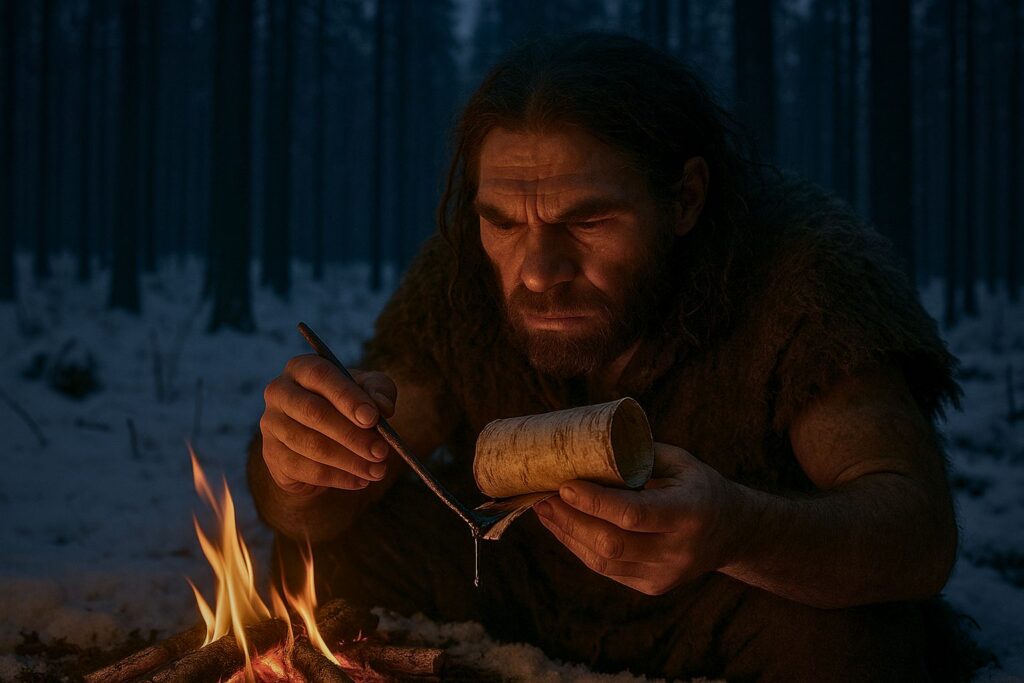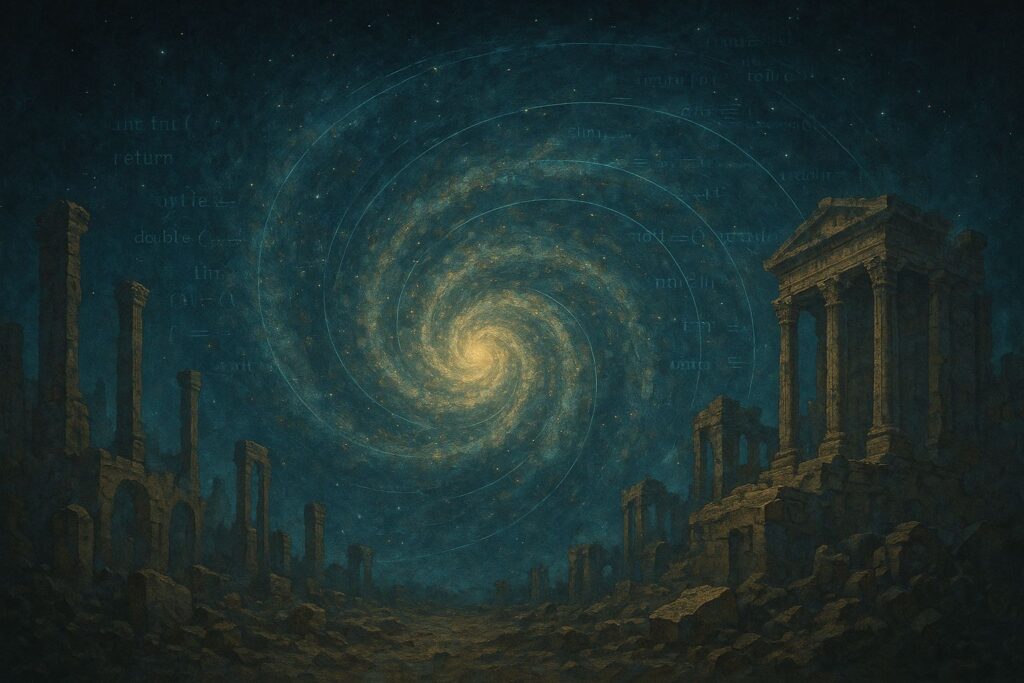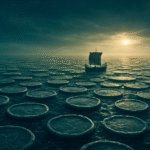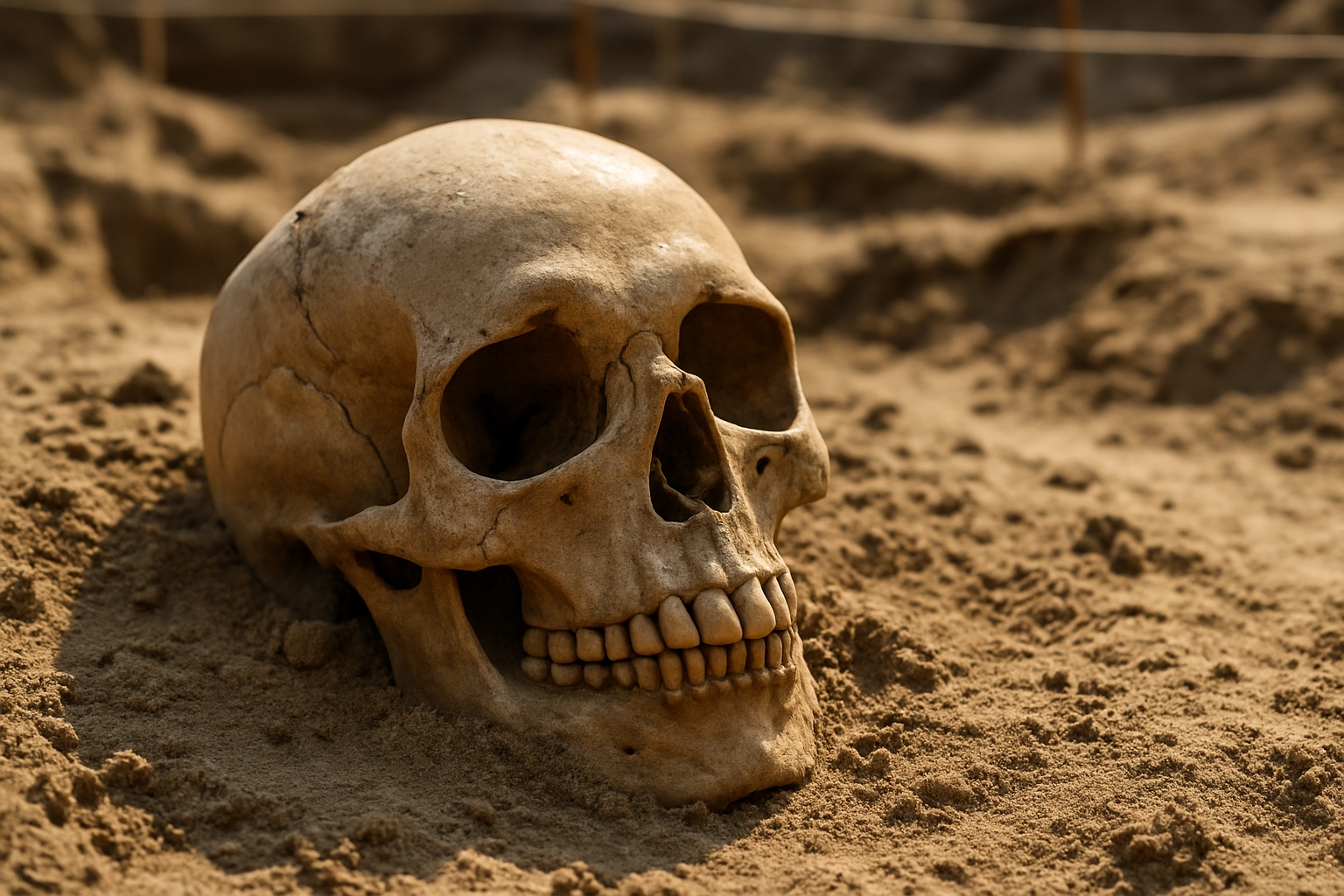Have you ever tried to truly imagine it? Not as a flat image in a textbook, but as a living moment. Join me for a second. Let’s travel back 40,000 years. The air is sharp, heavy with the scent of pine and damp earth. Before us, a person—one of our distant ancestors—is hunched over a small, controlled fire, their face illuminated by the flickering orange light. They are not merely seeking warmth. They are conducting an experiment.
Inside a carefully constructed roll of birch bark, they are heating the material in the absence of oxygen. It’s a process we now call pyrolysis, a delicate dance of temperature and time. Get it wrong, and you have nothing but ash.
“Get it right, and a thick, black, powerful adhesive seeps out—birch bark tar. “
This isn’t just primordial putty; it’s a two-part epoxy, a sophisticated glue strong enough to secure a stone point to a wooden spear, a tool that meant the difference between a full belly and starvation.
What I find myself wondering, in the quiet of my study, is not just how they did this, but who they were. This person was a scientist. They possessed no lab coat, no beakers, no body of established literature to consult. They had only observation, hypothesis, trial, and the crushing finality of error. The creation of this substance represents a chain of insights so complex it defies our cartoonish image of prehistoric life.
“It reveals a profound level of ancient human ingenuity.”
And then, in many parts of the world, the knowledge simply vanished. For thousands of years, the formula was lost. It was a ghost, a forgotten science that had to be painstakingly rediscovered by modern archaeologists. This brings a question to my mind that I cannot shake: Is our story of knowledge a straight, ascending line, or is it a spiral, forever tracing a cyclical history of science, discovery, and loss?

A realistic depiction of an ancient human creating birch bark tar by a fire.
The Great Wheel: Evidence of Lost Ancient Knowledge
When we look back, we tend to do so with a sense of quiet superiority. We see ourselves at the apex of a long, arduous climb, the inheritors of all that came before. But what if that’s a profound misunderstanding of our own story?
The birch bark tar is just one whisper from this forgotten world. What about the Antikythera Mechanism, that breathtakingly complex astronomical computer recovered from a Roman-era shipwreck?
“For over a millennium after its creation, nothing of its sophistication was built again. “
It stands as a silent testament to a level of mechanical and mathematical genius that bloomed and then withered, its secrets drowned in the sea.
Or consider the reports of Damascus steel, a metal so strong and sharp it was legendary in the medieval world, yet the formula for its forging was lost to time. We see remnants of lost ancient knowledge everywhere, like high-water marks on a canyon wall after a flood has receded. They hint at a tide of understanding that was once much, much higher.
I find this thought both humbling and deeply unsettling. It suggests that humanity can, and does, forget. It suggests that societal progress is not guaranteed. We are not just capable of learning; we are tragically capable of losing what we have learned. An entire civilization’s worth of brilliance can be erased by war, by catastrophe, or perhaps most insidiously, by a simple lack of care—by a generation that fails to value the wisdom of the one that came before it.
This isn’t a failing of our ancestors. It is a human trait. And it forces us to turn the mirror on ourselves.
A Modern Crisis: The Decline of Trust in Science
If a complex, vital science like the creation of birch bark tar could be lost, what knowledge are we in danger of losing today? We might think such a collapse is impossible now. We have the internet, servers, libraries—a global network designed to preserve information forever.
“But knowledge is not the same thing as data.”
Knowledge is a living thing. It requires belief in the process that creates it. It requires trust. And it is precisely that trust in science that I fear we are beginning to lose.
The word “science” itself is becoming a casualty. It is increasingly wielded not as a description of a method, but as a cudgel in cultural and political debates. On all sides, the phrase “science says” is used to shut down conversation, to signal tribal allegiance, or to grant unearned authority to an idea that has not endured the rigors of the scientific method.
The scientific method, at its core, is an act of profound humility. It is a process built on the admission that we do not know. It is about formulating a question, testing it with rigor, and—most importantly—being willing to be proven wrong.
“It is a slow, iterative, and often frustrating journey toward a slightly clearer understanding of reality.”
When we strip away the process and simply use the word science as a stamp of absolute truth, we are not celebrating knowledge. We are creating a new form of dogma. And people, quite rightly, are beginning to recoil from it. They sense the disconnect between the spirit of genuine inquiry and the rigid certainty with which the word is often used. This erosion of trust is the fertile ground where our own modern “dark age” could begin. It’s a quiet crisis, one that happens not in a burning library, but in the subtle turning away of millions of minds from a process they no longer feel they can believe in.

An abstract image of a spiral galaxy mixed with ancient ruins, symbolizing the cyclical history of science.
The Paradox of Progress: Why Do We Forget What We Learn?
Why is this happening now? Why are we becoming so vulnerable to losing our grip on the value of genuine inquiry?
I can’t help but wonder if part of the answer lies in a strange paradox: our own success. For most of human history, survival was a daily, razor-sharp imperative. The person making that birch bark tar needed it to work. The community that learned to track the stars needed to predict the seasons. Ingenuity wasn’t a hobby; it was a non-negotiable contract with reality. Their intellectual curiosity was fused with the drive to live.
Today, for many of us in the developed world, that sharp edge has been dulled. Our survival is cushioned by layers of technology and infrastructure so vast we no longer see them. We don’t need to know how our food is grown, how our water is purified, or how the global supply chain delivers a smartphone to our door.
“Life is, in many ways, easier.”
But has that comfort come at a cost? Have we, in our ease, outsourced our curiosity? When you don’t have to understand the world to survive it, it becomes dangerously easy to stop trying. It becomes easier to accept a simple, pre-packaged answer—no matter how inaccurate—than to engage in the difficult, messy work of thinking for yourself.
This is not a judgment; it is a heartfelt concern. It is the soil in which mistrust and misinformation grow best. When our innate drive for understanding atrophies, we create a vacuum, and that vacuum will be filled by something else—ideology, fear, simplistic narratives that offer the comfort of certainty without the effort of discovery. This is how a culture begins to forget how to remember.
Rekindling the Fire: How to Preserve Knowledge
So, where does this leave us? Standing on a precipice, looking back at the ghosts of forgotten knowledge and looking forward into a fog of uncertainty?
Perhaps. But I don’t believe our story has to be a tragedy. I don’t believe we are doomed to repeat the cycle of loss. The future of knowledge is not a predetermined path we are forced to walk. It is a choice we make, individually and as a culture.
The choice is to turn away from the noise and rediscover the quiet, powerful hum of genuine curiosity. It is to remember that science is not a body of facts to be memorized and weaponized. It is a way of seeing. It is a posture of wonder toward the universe. It is the courage to say, “I don’t know, but I am willing to find out.”
“This is not a task we can leave to “scientists” in their labs. “
It belongs to all of us. It lives in the parent who answers a child’s relentless “why?” with a shared journey of discovery instead of a dismissal. It lives in the citizen who reads past the headline, seeks out opposing views, and learns to sit with the discomfort of not having an immediate answer. It lives in our ability to distinguish between the hard-won product of the scientific method and the empty shell of the word used for marketing or control.
Our ancestors, sitting by their fires, possessed a deep-seated, burning need to understand their world. We are their children. That fire is not extinguished; it is merely banked. Our task is to breathe on the embers, to protect that flame of intellectual curiosity and feed it with our attention and our passion. We must choose to be active participants in our own story, not passive consumers of its conclusions. For in the end, the only thing that can truly safeguard knowledge is a culture that loves it.
Join The Project
The inquiry doesn't end with this article. Our weekly newsletter is where The Project continues. Each week, we deliver new findings—from deconstructing ancient history to forging philosophical thought experiments. It's our expedition into the source code of the human story, delivered directly to your inbox.
We are JD Lemky. He’s a physical chemist trained in academic rigor; she’s an editor with degrees in both literature and biochemistry. We use a scientist’s skepticism and a storyteller’s eye to challenge the official history, exploring the echoes of lost worlds to find what they can teach us about our own.



